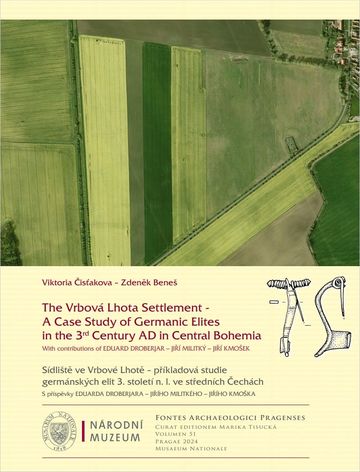
The Vrbová Lhota Settlement – A Case Study of Germanic Elites in the 3rd Century AD in Central Bohemia / Sídliště ve Vrbové Lhotě – Příkladová studie germánských elit 3. století n. l. ve středních Čechách
ISBN: 978-80-7036-830-5, 978-80-7036-833-6 (pdf)
Author(s): Viktoria Čisťakova, Zdeněk Beneš
Publisher: National Museum
Type of publication: Book / E-book
Place of publication: Prague
Number of pages: 128
Citation: ČISŤAKOVA, Viktoria a BENEŠ, Zdeněk. The Vrbová Lhota Settlement – A Case Study of Germanic Elites in the 3rd Century AD in Central Bohemia / Sídliště ve Vrbové Lhotě – Příkladová studie germánských elit 3. století n. l. ve středních Čechách. Vydání první. Prague: National Museum, 2024. 128 stran. ISBN 978-80-7036-830-5, 978-80-7036-833-6 (pdf).
During the Roman Period, the region of the basin of the Výrovka Stream, a left-bank tributary of the Elbe River on the border of the districts of Kolín and Nymburk, contains an extraordinary concentration of funerary sites of particular European importance and which belong to the representative part of the National Museum collection (Dobřichov-Pičhora, Dobřichov-Třebická). The determined settlements thus far are an unexploited source of knowledge about the development of these key regions in Bohemia during the Roman Period. In recent years, the assemblage from the Vrbová Lhota site stands out among the other settlement sites from the 3rd century AD. The collection of the finds is characterised by a large number of metal finds, among which Roman imports stand out: parts of bronze vessels, bells, brooches, fittings and a bronze anthropomorphic statue. Also known from the site are numerous indicators of non-ferrous metalworking activities – these are often interpreted as some of the evidence of the presence of elites, who were suppliers of raw materials (often of Roman origin), but also customers of the finale products. Additional evidence of the presence of local elites is a rich collection of bronze, silver and gold coins dated to the 2nd century up to the second half of the 3rd century AD. The aim of this study is to evaluate an unpublished set of finds along with new ones coming from surface surveys (2020–2021 seasons) and based on the results of the archaeometric study of selected metal finds. With the aid of archaeometry, we attempt to analyse the metallurgical activities at the site and their relationship with other sites in the Central European part of the Barbaricum.
The e-book can be purchased in the online store Palmknihy.
